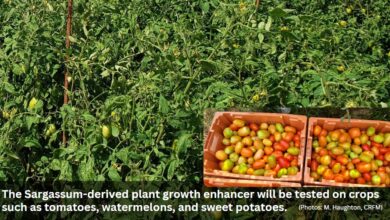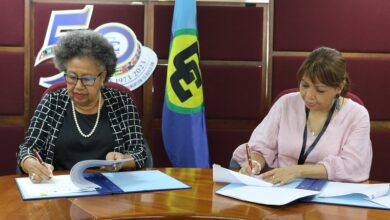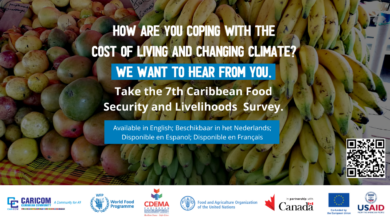(CARICOM Secretariat, Turkeyen, Greater Georgetown, Guyana) Distinguished Ladies and Gentlemen I feel particularly honoured to have been afforded the opportunity to deliver these remarks at the Tenth Caribbean Week of Agriculture in the Nature Island.
This occasion has special meaning for me, as I address you today as Secretary-General of the Caribbean Community (CARICOM), in my native land. It was here in Dominica that I received the groundings and the inspiration to pursue and persevere regardless of the challenges that exist. The lessons learnt here have put me in good stead for the tasks ahead as Secretary-General of a group of developing countries seeking to ensure a secure, viable and sustainable life for its citizens.
I assume the position of Secretary-General during a period when the world is reeling from the effects of a financial and economic crisis which continues to have a tremendous impact on us here in this Region. While we are still trying to recover from the devastating impact of the crisis on our economies, we have had to add high food prices to the long list of issues affecting our small vulnerable economies.
The nature and multiplicity of challenges that we are constantly faced with require us to work together and demand that we put in place cohesive policies and actions. In the current global and regional situation, our Heads of Government have recognised that the CARICOM Single Market and Economy (CSME) continues to be the best response.
This is why at their Special Retreat in Guyana last May, they resolved to consolidate the gains of the Single Market and to continue moving towards the Single Economy, including the development of the productive sectors such as Agriculture and Services, while paying due attention to achieving results on the ground in Member States.
Agriculture therefore is a key factor, to the success and continued development of this enterprise; and I might add that its sustainability and continuity will be so much more assured with the greater participation of our youth in the sector.
Our purpose here this week, is yet another attempt for the Caribbean Community in collaboration with our partners and stakeholders to use its collective resources to address the particular constraints inhibiting the further growth and development of the agriculture sector.
Ladies and Gentlemen,
The theme of this Tenth Caribbean Week of Agriculture, “Caribbean Food and Nutrition Security in a Changing Climate – the Nature Island Experience”, is relevant, given the threats currently posed by rising food prices and climate change – both of which have very serious implications for the Region’s food and nutrition security and the livelihoods of our people.
This Caribbean Week of Agriculture not only highlights the significance of agriculture to the development of our Community, but provides an opportune moment for us to demonstrate that we are serious about achieving food and nutrition security and ensuring cost-efficient production in the sector. The Region’s food import bill currently hovers at around US$4 billion, with processed products accounting for most of that amount.
Two months ago, global food prices were 26 per cent higher than the corresponding period last year. The challenge facing us in addressing the high food import bill and increasing food prices is the creation of sustainable food production systems. We have to maintain a supply of healthy food at affordable prices even as there is mounting pressure on nearly every element affecting the process. We must increase our regional content in food; we must utilise more local inputs, feeds and fertilizers; and we must improve the productivity of land, labour and capital.
We, therefore, have to be more proactive than reactive. The removal of the key binding constraints to the development of the agriculture sector identified in the `Jagdeo Initiative’, is necessary to boost the Region’s food production and ensure food and nutrition security. We also need to influence the taste and preference of our households to consume nutritionally-balanced foods that are produced locally, thus safeguarding against chronic Non-Communicable Diseases (NCDs) which are prevalent in the Region.
The stark reality is that Non-Communicable Diseases (NCDs) are the biggest killer in the Region and we must look to improve in all areas which can help reduce its impact. There is none more basic than the food we consume. Some Member States have already introduced policies and programmes aimed at encouraging a change in food consumption patterns.
For example, Guyana, Barbados and Trinidad and Tobago, are moving ahead with cassava flour initiatives as one way of addressing the high costs of importing wheat. In Jamaica, the “Eat Jamaica” initiative was launched earlier this year with its Agriculture Minister indicating that Jamaica could replace 45 percent of imported food items with local produce.
I applaud Member States involved in these developments as well as the initiatives towards a regional market information system that will provide objective information on the regional markets for both consumers and producers. It is important to note here, that last October, our Ministers of Agriculture approved the Regional Policy for Food and Nutrition Security.
The Policy aims to ensure that food production, processing, marketing, food safety and agricultural public health systems are capable of providing safe, adequate, nutritious and affordable food for consumers at all times. To give effect to the Policy, an Action Plan, with identified priorities, is being submitted for approval to the Special Meeting of the Council for Trade and Economic Development (COTED) on Agriculture on Friday.
With regard to agricultural health and food safety, the Community has also moved to put into effect a regime on Sanitary and Phyto-Sanitary measures to ensure that the production and trade in agricultural commodities are safe for human consumption, and to safeguard the Region from harmful pests and diseases.
The Caribbean Agricultural Health and Food Safety Agency (CAHFSA) will be the vehicle to do so and I look forward to it becoming operational in the near future. We are working with IICA and other partners towards that objective.
Ladies and Gentlemen, The recent advances we are making regionally in the agriculture sector in no small measure can be attributed to the close working relationship with our partners in agriculture such as FAO, IICA, CTA, and CAFAN. This evening, I want to recognize their contribution. Such collaboration has resulted in a greater level of confidence in the work we are doing which has allowed us to attract significant resources to implement our regional agriculture programmes. In closing, I wish to thank the organisers of this Caribbean Week of Agriculture, especially Members of the Alliance and the Local Coordinating Committee for the excellent arrangements put in place for the success of this week’s activities. I thank you.





